US Gulf Coast-bound Fuel Oil Cargoes Hit Five-year Low

Fuel oil exports bound for the U.S. Gulf Coast slumped to their lowest level since January 2019 last month, a sign of weakened refinery demand as margins have softened, analysts said.Feedstocks like high sulfur fuel oil and other heavy residues can be refined into higher value products such as gasoline and diesel using secondary units.But loadings of those products to the Gulf Coast, America's largest refining hub, fell by a third in August from the prior month to 260,000 barrels per day (bpd)…
US Gulf Coast Fuel Oil Imports Hit Five-year Low

Imports of fuel oil bound for the U.S. Gulf Coast fell to a five-year low last month as refiners ran more cheap, heavy Canadian crude and geopolitical tensions in the Middle East pressured fuel oil flows.Fuel oil deliveries to the Gulf Coast dwindled in February to just 318,000 barrels per day (bpd), a 20% drop from the prior month and marking their lowest level since February 2019, data from tanker tracking firm, Kpler showed.Heavy fuel oil feedstocks like high sulfur fuel oil…
Decarbonisation Group's Biofuel Bunkering Trial Finds Sharp Drop in Emissions
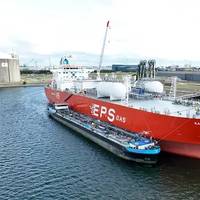
The Global Centre for Maritime Decarbonisation (GCMD) found carbon emissions fell 83% using a vegetable oil biofuel blend compared with marine gasoil in a trial for a dual-fuel liquefied petroleum gas (LPG) carrier, the center said on Tuesday.This was the third of five supply chain bunkering trials that the GCMD has undertaken as part of an $18 million project to test different biofuel blends to reduce carbon emissions. The trials are key to helping the fuel and shipping industries…
HMM Signs Biofuels MoU
![[From left to right] S.H. LEE (Executive Vice President, GS Caltex); Park, Jinki (Senior Executive Vice
President, HMM)](https://images.marinelink.com/images/maritime/w200h200c/from-left-to-right-sh-140589.jpg)
Hyundai Merchant Marine (HMM) has signed a Memorandum of Understanding (MoU) with GS Caltex to secure marine biofuels.HMM plans to conduct the trial use of the fuels on its three 24,000 TEU container ships in the second half of this year. The biofuels comprise 30% biodiesel derived from used cooking oil and 70% high-sulfur fuel oil (HSFO).Biodiesel reduces greenhouse gas emissions by 80% compared to conventional fuels, notes HMM. Biofuels also have the merit of being compatible with current ship engines without technological modification.In 2021…
Eagle Bulk's Scrubbers Investment Pays Off
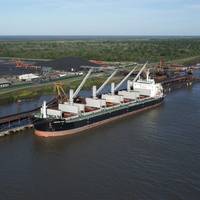
U.S. shipowner Eagle Bulk's 2018 decision to outfit the majority of its dry bulk fleet with scrubbers has proven to be an environmentally sound and profitable decision, with an expected payback on investment by the end of 2022.The company's CEO Gary Vogel and Chief Strategy Officer Costa Tsoutsoplides said in a recent trade press interview that Eagle Bulk answered the MARPOL 2020 0.5% emissions ceiling with a $100 million investment to equip 47 ships—89% of its fleet of supramaxes and ultramaxes—with CR Ocean Engineering (CROE) scrubbers.Having already recorded $60 million of fuel savings…
US Receiving Last Russian Oil Cargoes Before Wind-down
Nine tankers carrying Russian-origin crude and fuel oil have discharged in the United States in April, likely the last ones to deliver before a wind-down set by Washington expires this week, customs and tanker tracking data showed.The United States last month set an April 22 ban on imports of Russian crude and refined products. The United States gave importers of Russian petroleum, liquefied natural gas and coal 45 days to take en route and under-contract cargoes.Tanker Seamagic, which loaded fuel oil at Russia’s Taman port, discharged at Valero Energy’s St. Charles, Louisiana, refinery last week, the last of the nine tracked to discharge.
Multiple Ships Suffer 'Blackouts' Due to Tainted Bunker Fuel from Singapore

A major bunker fuel contamination has affected at least 14 shipping vessels that received high sulfur fuel oil (HSFO) from Singapore, fuel, and oil testing firm Veritas Petroleum Services (VPS) said.The company said an increasing number of ships were getting affected by the tainted bunker fuel after 34 vessels were identified to have received HSFO deliveries from two unnamed Singapore suppliers over the last two months that were contaminated with up to 2,000 parts per million…
Euronav Concludes B50 Biofuel Blend Trial
After a successful completion of a B30 biofuel blend test on the Suezmax Statia (2006 – 150,205 dwt), Euronav has now successfully concluded a B50 biofuel blend trial on its Suezmax Marlin Sardinia (2019 – 156,607 dwt). The biofuel, by marine fuels supplier TFG Marine (the bunkering arm of Trafigura), was tested on its longevity and durability over a period of four months. This second trial confirms the potential of biofuel and the crucial role it plays in the decarbonization of shipping.In June 2021, the Suezmax Marlin Sardinia was bunkered with 240 MT of B50 biofuel blend from TFG Marine. Just as the B30 biofuel blend, the B50 was supplied in the port of Rotterdam…
China to Be Self-reliant in IMO-compliant Fuel
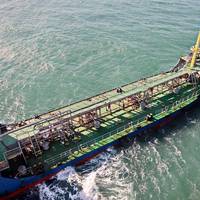
Chinese refiners have the capacity to produce 18.1 million tonnes of low-sulphur fuel oil (LSFO) this year, which would make the country self-sufficient in the new shipping fuel, an official with state major PetroChina said on Monday.China has been striving to reduce its reliance on bunker fuel imports and is aiming to create its own marine fuel hub to supply northern Asia.About 20 refineries, mostly under state-run Sinopec Corp, PetroChina, CNOOC and Sinochem, installed equipment to produce 0.5% sulfur fuel that meets International Maritime Organization (IMO) rules that came into force at the
US Refiners Grab HSFO on Back of IMO 2020
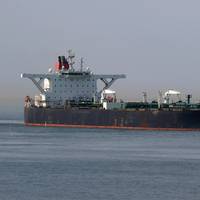
U.S. refiners are scooping up cheap high-sulfur fuel oil for processing from Russia and the Baltic states as they take advantage of new shipping rules that have cut demand for the dirtier marine fuel, according to oil traders and shipping data.U.S. refiners Valero Corp, Chevron Corp and Phillips 66 have been buying HSFO, traders said, taking advantage of their complex operations to turn HSFO blended with crude oils into products like diesel, gasoil and gasoline.This month, 2.2 million tonnes of fuel oil…
Hudson Shipping Joins Trident Alliance
United States based commodities trader Hudson Shipping Lines (HSL) became a member of the Trident Alliance as part of the company’s ongoing ‘green’ initiatives.The shipping company is increasing its commitment to cleaning up the shipping industry in conjunction with two environmental organizations. Hudson has recently joined the Trident Alliance as a member.“The shipping industry has a tremendous opportunity to improve its impact upon the world with the IMO 2020 sulfur cap. Hudson believes it has a responsibility to encourage companies and countries to comply with both the letter and also the spirit of the sulfur rules,” said company President, Avi Eilon.
IBIA, S&P Partner to Encourage IMO2020
The International Bunker Industry Association (IBIA) and price-reporting agency S&P Global Platts are to work together to help market participants across the shipping ecosystem prepare ahead of the implementation of the International Maritime Organization (IMO) low sulfur marine fuel regulations in January 2020.Unni Einemo, Director of IBIA and its representative at the IMO said: "We are very pleased to work with S&P Global Platts in bringing industry stakeholders the tools they need to manage the transition to IMO 2020."Unni added: "IBIA has been heavily engaged in working at the IMO to help develop guidelines for effective implementation…
Cosmo Oil Builds IMO-compliant Fuel Stocks at Chiba Port
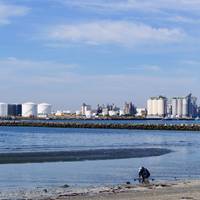
Japan’s third-largest oil refining company, Cosmo Oil, , has started building stocks of very-low-sulfur fuel oil (VLSFO) for supply to domestic marine fuel markets from next month (October 2019) ahead of the IMO 2020 mandate requiring ships globally to reduce their bunker fuel sulfur content to 0.5% from the current 3.5% from January 2020.Cosmo Oil is using VLSFO produced at its residue desulfurizer (RDS) unit at its Chiba refinery near Tokyo to build the stocks, Cosmo Oil’sPresident Shunichi Tanaka said on Sunday…
Preparing for IMO 2020: Marine Emission Solutions
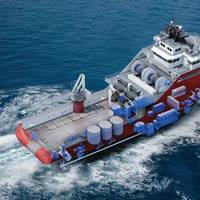
Part I: Enhancing Engines & Fuels"Wood Mackenzie forecasts a 25 percent increase in price for lower sulfur content fuel based on a SOx scrubber adoption rate of about two percent, but some scenarios could cause LSFO prices to spike by as much as 60 percent."Around 80 percent of global trade is carried by sea. With more than 125,000 commercial and naval vessels operating around the world, ship-engine emissions are projected to rise by 250 percent by 2050 unless controls are imposed.
Fuel Futures: Diesel Will Spike on IMO2020
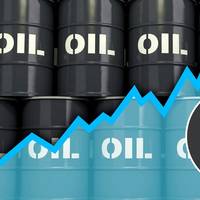
New marine fuel rules to boost diesel prices for at least a year -analystsGlobal prices for diesel and marine fuels should rise by October ahead of a January switchover to new, very low-sulfur marine fuels, and remain higher for at least a year as refiners shift production to make more of the new fuels, analysts said.Marine fuels containing no more than 0.5% sulfur by weight, down from the 3.5% currently used, to power ocean-going vessels will be required for ships without exhaust scrubbers on Jan.
Marine Fuel Rules to Disrupt Markets for 1-5 years

The marine industry's January 2020 shift to using very low sulfur fuel oil (VLSFO) to power ships worldwide will launch a one- to five-year disruption in oil and refined products markets, according to a study released Thursday by Boston Consulting Group.The International Maritime Organization (IMO)'s mandated switch will require fuels to have a sulfur content below 0.5%, compared with 3.5% now. It aims to improve human health by reducing air pollution from sea-going vessels.The changeover may increase profits for refiners, especially on the U.S.
IMO 2020 Impact on Fuel Bunker
When new International Maritime Organization’s (IMO’s) bunker fuel regulations come into effect on January 1, 2020, there remains uncertainty regarding the availability and pricing for all marine fuel, as owners grapple with technical solutions for compliance.The sulfur content limits in bunker fuels used outside the designated Emission Control Areas (ECAs) will be reduced to 0.5% (from 3.5%) to reduce air emissions from shipping.High sulfur fuel oil (HSFO) currently represents nearly 80% (approx. 3.84 million bpd) of the 5.0 million bpd global bunker demand, which will become non-compliant.Essentially, ship owners have three options: 1) Switch to compliant fuels…
Rystad Expects Oil Price Rally in H1 of 2020
The energy research and business intelligence company Rystad Energy expects that a short-lived price rally through the first half of 2020 as oil prices approach $70 a barrel.It will then lose momentum and be replaced by a need for additional production cuts by Russia and the cartel of oil producing countries, OPEC, the Norway-headquartered firm said.“We retain our bullish stance for the second half of 2019 and first half of 2020 as we anticipate OPEC+ to extend production cuts through 2019, while we also expect bullish oil market effects due to the introduction of IMO 2020 regulations on sulfur content in marine fuels,” says Bjørnar Tonhaugen, Head of Oil Market Research at Rystad Energy.He added: “However, the effects of the IMO 2020 ‘scramble’ will likely be short-lived.
ExxonMobil Readies IMO 2020 Compliant Fuel
ExxonMobil said that all its International Maritime Organization (IMO) compliant 0.5% sulfur bunker fuels developed to date are residual grades.The oil giant has also announced specification details and confirmed that the formulations are all compatible with each other, provided that bunkering, storage and handling best practice guidance is followed.All of ExxonMobil’s announced low sulphur compliant fuels will be residual grades and will also be compatible with each other, provided best practice guidance for bunkering, handling and storage is followed, it said.It said the fuel will be available prior to the IMO deadline at Antwerp, Rotterdam, Genoa, Marseilles, Singapore, Hong Kong and Laem Chabang in Thailand.
TORM to Feature Scrubbers in Newbuildings
Danish shipping company TORM is installing scrubbers to its vessels, allowing them to continue running on high sulfur fuel oil after the International Maritime Organization's marine fuels sulfur limit is cut in 2020.A press release from the company said that it has decided to install scrubbers on 14 vessels including all vessels currently on order and the three LR2 vessels that were delivered earlier in 2018.These vessels have a scrubber-prepared design and there are no changes to the delivery schedule. As of today, TORM’s scrubber program covers four LR2s, two LR1s and eight MRs.Danish producer tanker group's Executive Director Jacob…
High-sulphur Fuel Demand Outlook Jumps as Shippers Soften Stance on Scrubbers
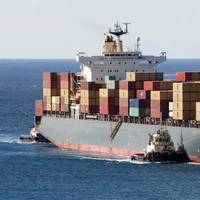
Demand for high sulphur marine fuels is likely to see a smaller drop than previously expected by 2020, said consultancy FGE, as changing attitudes to sulphur-stripping technologies from large shippers alter the outlook for use of the fuels.More than 2,100 vessels are now expected to be equipped with exhaust gas cleaning systems, known as scrubbers, by 2020, up from 1,500 ships previously, said Thomas Olney, energy consultant at FGE in Singapore.Adding to the improved demand outlook is "a much greater skew towards installing scrubbers on larger vessels that burn higher quantities of fuel…
IMO 2020: Exxon Mobil Projects 25% Decline in High-Sulfur Fuels

Exxon Mobil Corp expects high-sulfur fuel oil demand to fall 25 percent by 2025, as a new set of emission regulations from the International Maritime Organization capping sulfur content in shipping fuel at 0.5% kicks in in 2020, a top-level official at the U.S. oil and gas company said on Monday.The International Energy Agency has forecast high-sulfur fuel oil demand to fall 60 percent next year, while marine gas oil demand to more than double.Exxon's forecast comes as its refining business is struggling to find enough heavy crude to make fuel oil and other distillates, in the face of U.S.
IMO 2020: Shell, HES to Resurrect Refinery
Royal Dutch Shell has struck a deal with Dutch tank terminal firm HES International to partially restart a German oil refinery mothballed since 2011 in response to new restrictions on marine fuels, two trading sources told Reuters.A new cap set by the International Maritime Organization (IMO) that will cut the sulfur content in shipping fuel to 0.5 percent from 3.5 percent from next year is set to be one of the biggest fundamental events to hit oil markets in years.HES Wilhelmshaven Tank Terminal is in the process of reinstalling the vacuum distillation unit (VDU) at Wilhelmshaven to produce low-sulfur bunker fuels ahead of the implementation of the IMO rules…







